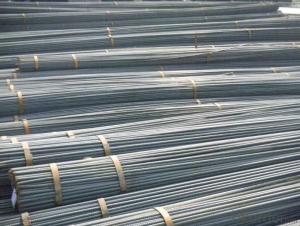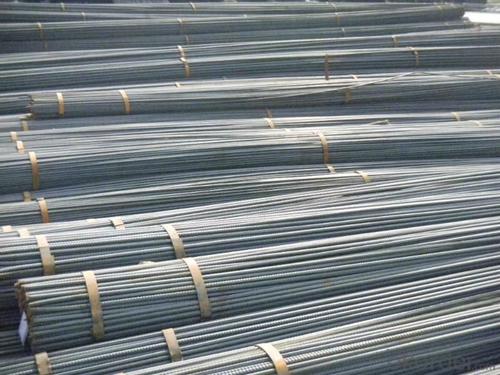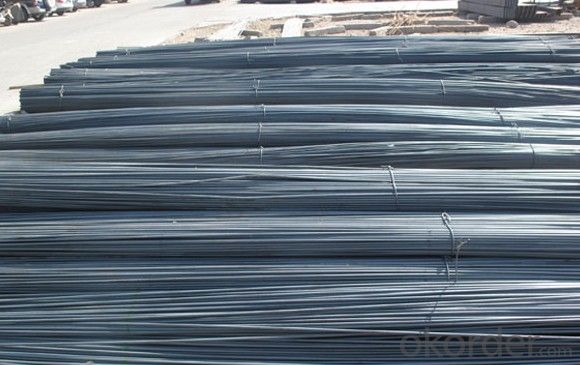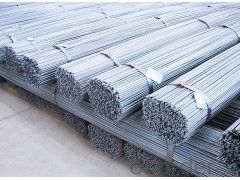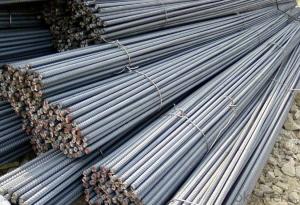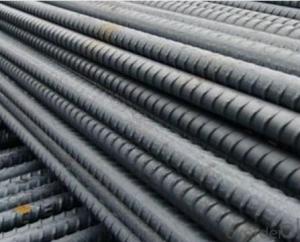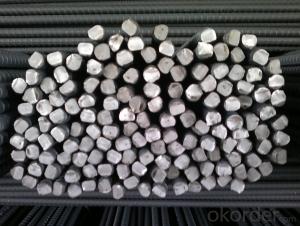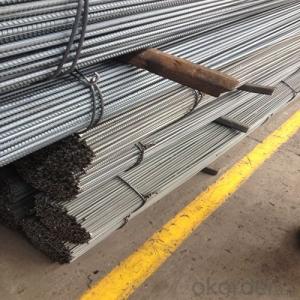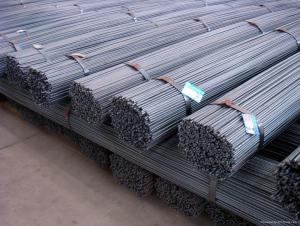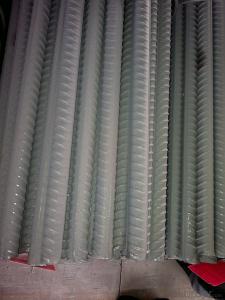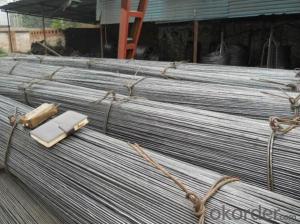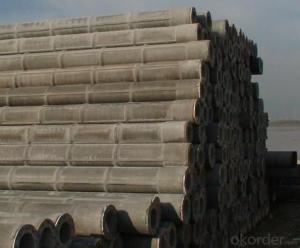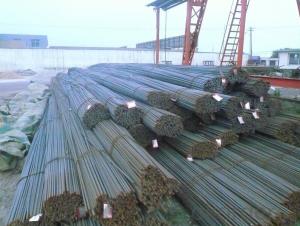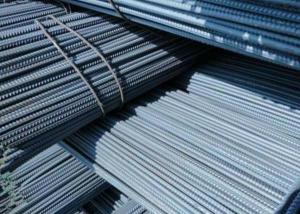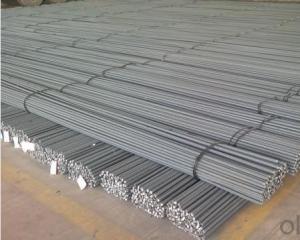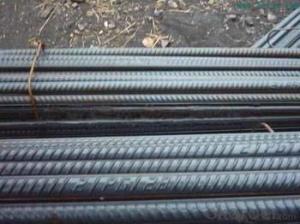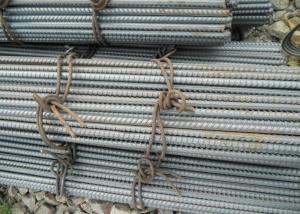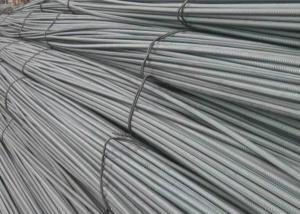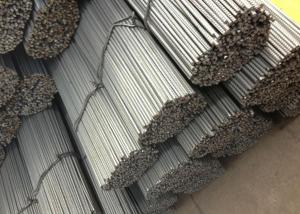Hot rolled deformed steel bar for construction
- Loading Port:
- Tianjin
- Payment Terms:
- TT or LC
- Min Order Qty:
- 25 m.t.
- Supply Capability:
- 100000 m.t./month
OKorder Service Pledge
OKorder Financial Service
You Might Also Like
Product Description:
OKorder is offering hot rolled deformed steel bar for construction at great prices with worldwide shipping. Our supplier is a world-class manufacturer of steel, with our products utilized the world over. OKorder annually supplies products to European, North American and Asian markets. We provide quotations within 24 hours of receiving an inquiry and guarantee competitive prices.
Product Applications:
Hot rolled deformed steel bar for construction are ideal for structural applications and are widely used in the construction of buildings and bridges, and the manufacturing, petrochemical, and transportation industries.
Product Advantages:
OKorder's deformed steel bar are durable, strong, and resist corrosion.
Main Product Features:
· Premium quality
· Prompt delivery & seaworthy packing (30 days after receiving deposit)
· Corrosion resistance
· Can be recycled and reused
· Mill test certification
· Professional Service
· Competitive pricing
Product Specifications:
Deformed bar is widely used in buildings, bridges, roads and other engineering construction. Big to highways, railways, bridges, culverts, tunnels, public facilities such as flood control, dam, small to housing construction, beam, column, wall and the foundation of the plate, deformed bar is an integral structure material. With the development of world economy and the vigorous development of infrastructure construction, real estate, the demand for deformed bar will be larger and larger..
Packaging & Delivery of HRB400 Deformed Steel Bar:
Packaging Detail: products are packed in bundle and then shipped by container or bulk vessel, deformed bar is usually naked strapping delivery, when storing, please pay attention to moisture proof. The performance of rust will produce adverse effect.
Each bundle weight: 2-3MT, or as required
Payment term: TT or L/C
Delivery Detail: within 45 days after received advanced payment or LC.
Label: to be specified by customer, generally, each bundle has 1-2 labels
Trade terms: FOB, CFR, CIF
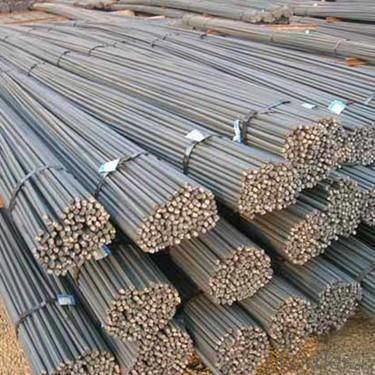
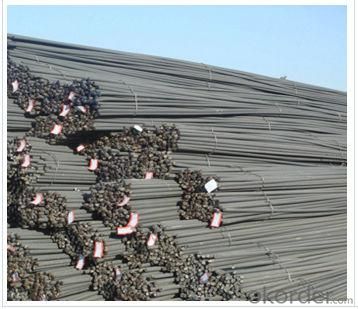
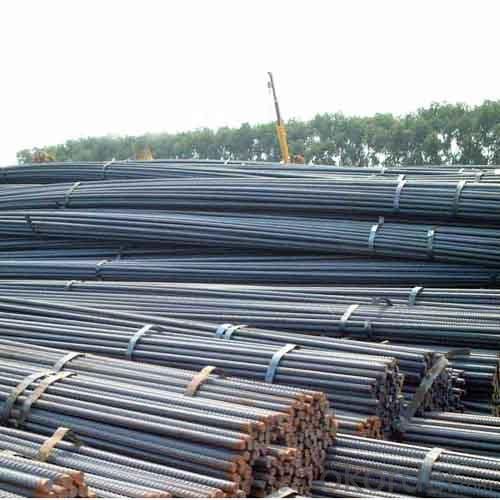
FAQ:
Q1: How do we guarantee the quality of our products?
A1: We have established an advanced quality management system which conducts strict quality tests at every step, from raw materials to the final product. At the same time, we provide extensive follow-up service assurances as required.
Q2: Can stainless steel rust?
A2: Stainless does not "rust" as you think of regular steel rusting with a red oxide on the surface that flakes off. If you see red rust it is probably due to some iron particles that have contaminated the surface of the stainless steel and it is these iron particles that are rusting. Look at the source of the rusting and see if you can remove it from the surface.
- Q: Excuse me, Shagang steel steel, what is the sign of
- There are two kinds of commonly used classification methods of thread steel: one is to shape classification, according to different space shapes and transverse rib rib for classification or type, such as the British Standard (BS4449), the thread steel is divided into type I and type ii. This classification mainly reflects the tightening performance of the threaded steel.
- Q: Can steel rebars be painted or coated for aesthetic purposes?
- Indeed, it is possible to paint or apply a coating to steel rebars in order to enhance their aesthetic appeal. By painting or coating these rebars, their appearance can be improved and they can be made to blend in harmoniously with the surrounding structures or environment. The choice of paint or coating can be made based on the desired color or style, enabling the rebars to seamlessly integrate into the overall design. Additionally, painting or coating the rebars can serve as a protective layer against corrosion, thereby prolonging their lifespan. However, it is crucial to bear in mind that the paint or coating used must be specifically formulated for steel and possess the ability to adhere firmly to the surface, guaranteeing both durability and longevity.
- Q: Are there any specific safety guidelines for working with steel rebars?
- Yes, there are specific safety guidelines for working with steel rebars. These guidelines include wearing personal protective equipment such as gloves, safety glasses, and steel-toed boots. Workers should also be trained on proper lifting techniques and should use mechanical aids when necessary to prevent injuries. Additionally, it is important to ensure that the work area is clear of any hazards and that all tools and equipment are in good condition. Regular inspections and maintenance of the rebars should also be conducted to prevent any potential accidents.
- Q: Are there any limitations on the length of steel rebars?
- Industry standards and guidelines typically dictate the length of steel rebars, imposing limitations based on practical and logistical factors. One restriction pertains to the transportation and handling of rebars. Although steel rebars are usually produced in lengthy sizes, such as up to 60 feet (18 meters) or more, the weight and rigidity of rebars make it challenging to transport and maneuver them effectively. Therefore, rebars are commonly cut into shorter lengths for easier transportation and handling on construction sites. Another limitation concerns the structural integrity of rebars. Lengthier rebars are more susceptible to bending, warping, or sagging, which can compromise their effectiveness in reinforcing concrete structures. To ensure structural integrity, rebars are often restricted to specific lengths based on the particular application and design requirements. Furthermore, local building codes and regulations may impose additional limitations. These regulations aim to guarantee the safety and durability of structures. They might stipulate the maximum length of steel rebars permissible for different construction applications to meet the required standards and ensure the building's structural integrity. In conclusion, while steel rebars can be manufactured in extended lengths, considerations such as practicality, structural integrity, and compliance with local regulations often impose limitations on their size. These limitations are in place to facilitate the efficient transportation and handling of rebars, maintain their structural integrity, and adhere to building codes and regulations.
- Q: How do steel rebars resist shear forces in concrete structures?
- Steel rebars resist shear forces in concrete structures by providing additional strength and reinforcement. The rebars are embedded within the concrete, creating a composite material that can withstand shear stresses. The steel rebars help to distribute the shear forces evenly throughout the structure, preventing cracks and failure. Additionally, the high tensile strength of the steel rebars allows them to resist deformation and displacement under shear loads, ensuring the stability and integrity of the concrete structure.
- Q: Can steel rebars be used in historical bridge restoration?
- Yes, steel rebars can be used in historical bridge restoration. In many cases, historical bridges may have deteriorated or suffered damage over time, and steel rebars can provide strength and stability during the restoration process. Steel rebars are commonly used in reinforced concrete structures and can help reinforce the bridge's structural integrity. However, it is important to consider the aesthetics of the historical bridge and ensure that the use of steel rebars does not compromise its historical value or appearance. Preservation guidelines and consultations with historical experts can help determine the appropriate use of steel rebars in historical bridge restoration projects.
- Q: What is the average lifespan of a reinforced concrete structure with steel rebars?
- The lifespan of reinforced concrete structures with steel rebars can differ based on several factors, such as construction quality, maintenance, exposure to environmental conditions, and patterns of usage. However, when designed, built, and maintained properly, these structures can last for 50 to 100 years or even longer. Reinforced concrete structures are renowned for their durability and strength, owing to the combination of concrete and steel reinforcement. Concrete provides compressive strength, while steel rebars offer tensile strength, making the structure resistant to various loads and forces. Yet, as time passes, reinforced concrete structures may deteriorate due to factors like moisture exposure, chemical exposure, temperature fluctuations, and loading conditions. These factors can lead to corrosion of the steel rebars, which is a common concern for the longevity of such structures. Corrosion occurs when moisture and oxygen infiltrate the concrete, causing the steel rebars to rust. This rusting process can result in the expansion of the steel rebars, leading to cracks in the concrete and further accelerating the structure's deterioration. To mitigate the effects of corrosion and extend the lifespan of reinforced concrete structures, several measures can be taken. These measures encompass using high-quality concrete and steel rebars, applying protective coatings, implementing effective drainage systems, and conducting regular inspections and maintenance. With proper maintenance and care, reinforced concrete structures can surpass their average lifespan. Nevertheless, it is crucial to acknowledge that the lifespan can vary depending on specific circumstances and conditions. Therefore, it is essential to consult structural engineers and industry experts to evaluate and determine the expected lifespan of a particular reinforced concrete structure.
- Q: What is the typical weight per meter of a steel rebar?
- The typical weight per meter of a steel rebar can vary depending on its size and grade. However, as a general guideline, a standard mild steel rebar with a diameter of 10 millimeters (mm) usually weighs around 0.616 kilograms per meter (kg/m). For larger sizes, such as a 20 mm rebar, the weight per meter can increase to approximately 2.47 kg/m. It is important to note that these values are approximate and may vary slightly depending on the specific manufacturing standards and regional regulations.
- Q: How do steel rebars contribute to the strength of concrete structures?
- Steel rebars contribute to the strength of concrete structures by providing reinforcement and increasing their durability. When embedded within concrete, rebars absorb tension forces that concrete alone cannot withstand, preventing cracking and improving the overall structural integrity. This combination of steel and concrete creates a composite material that can withstand greater loads and stresses, making it suitable for constructing buildings, bridges, and other infrastructure that require strength and stability.
- Q: What are the standards and specifications for steel rebars?
- International organizations such as ASTM and ISO primarily establish the standards and specifications for steel rebars, also known as reinforcing bars. These standards guarantee that steel rebars meet specific requirements for strength, durability, and dimensional accuracy. ASTM A615 is one of the most commonly used standards for steel rebars. It covers deformed and plain carbon-steel bars for concrete reinforcement. This standard sets the minimum yield strength, tensile strength, and elongation properties for various rebars grades, including Grade 40, Grade 60, and Grade 75. It also outlines the mechanical properties, chemical composition, and bending properties of rebars. Aside from ASTM A615, there are other standards that provide specifications for steel rebars. ASTM A706, for instance, focuses on low-alloy steel bars for concrete reinforcement. This standard ensures that rebars possess improved weldability and ductility to withstand seismic forces and other dynamic loads. ISO 15630 is another significant standard that addresses steel for concrete reinforcement. It provides specifications for hot-rolled and cold-worked steel bars, as well as welded fabric and lattice girders. ISO 15630 outlines the mechanical properties, chemical composition, and dimensional tolerances of rebars. Furthermore, regional or national organizations also establish their own standards for steel rebars. For instance, the BSI has developed the BS 4449 standard, which specifies the requirements for carbon steel rebars used in concrete reinforcement in the United Kingdom. Similarly, the ISI has set the IS 1786 standard for cold-twisted steel bars used in concrete reinforcement in India. In conclusion, the standards and specifications for steel rebars ensure that these construction materials possess the necessary strength, ductility, and other properties required for reinforcing concrete structures. By adhering to these standards, manufacturers, engineers, and construction professionals can ensure the safety and durability of reinforced concrete projects.
Send your message to us
Hot rolled deformed steel bar for construction
- Loading Port:
- Tianjin
- Payment Terms:
- TT or LC
- Min Order Qty:
- 25 m.t.
- Supply Capability:
- 100000 m.t./month
OKorder Service Pledge
OKorder Financial Service
Similar products
Hot products
Hot Searches
Related keywords
